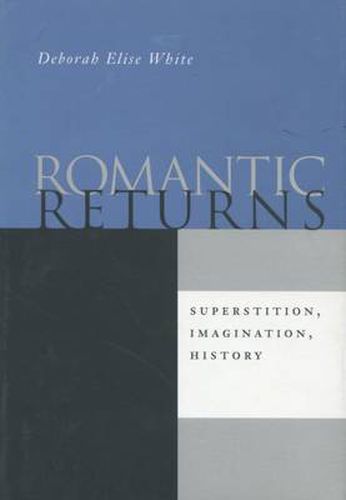Readings Newsletter
Become a Readings Member to make your shopping experience even easier.
Sign in or sign up for free!
You’re not far away from qualifying for FREE standard shipping within Australia
You’ve qualified for FREE standard shipping within Australia
The cart is loading…






Romantic Returns explores the theorization and operation of imagination in pre-romantic and romantic writing. Drawing on the poetry and prose of William Collins, William Hazlitt, and Percy Bysshe Shelley, it shows the continuing importance of their understanding of imagination for contemporary debates about the historicity of literature. Historicist readings of romanticism have done much to establish how and why romantic aesthetics is ideological an illusory if effective evasion of its material conditions. Romantic Returns challenges this position by arguing that romantic aesthetics is, rather, critical a reflective if problematic articulation of those conditions. The argument foregrounds the ways in which the aesthetics of romanticism inform its political and economic speculations. The book opens with an examination of mid-eighteenth-century debates about the role of superstition in the constitution of a national literary tradition. It considers, in particular, how Collins s odes figure Scotland as the site of a superstitious poetry that must be assimilated into British history even as Collins questions the very framework of assimilation. This ambiguous defense of superstition in the national polity is rewritten by romanticism as a defense of imagination. For the romantics, the concept of imagination involves an explicit theorization of how the mind s projections play a constitutive role in what appear to be social norms and economic facts.
$9.00 standard shipping within Australia
FREE standard shipping within Australia for orders over $100.00
Express & International shipping calculated at checkout
Romantic Returns explores the theorization and operation of imagination in pre-romantic and romantic writing. Drawing on the poetry and prose of William Collins, William Hazlitt, and Percy Bysshe Shelley, it shows the continuing importance of their understanding of imagination for contemporary debates about the historicity of literature. Historicist readings of romanticism have done much to establish how and why romantic aesthetics is ideological an illusory if effective evasion of its material conditions. Romantic Returns challenges this position by arguing that romantic aesthetics is, rather, critical a reflective if problematic articulation of those conditions. The argument foregrounds the ways in which the aesthetics of romanticism inform its political and economic speculations. The book opens with an examination of mid-eighteenth-century debates about the role of superstition in the constitution of a national literary tradition. It considers, in particular, how Collins s odes figure Scotland as the site of a superstitious poetry that must be assimilated into British history even as Collins questions the very framework of assimilation. This ambiguous defense of superstition in the national polity is rewritten by romanticism as a defense of imagination. For the romantics, the concept of imagination involves an explicit theorization of how the mind s projections play a constitutive role in what appear to be social norms and economic facts.